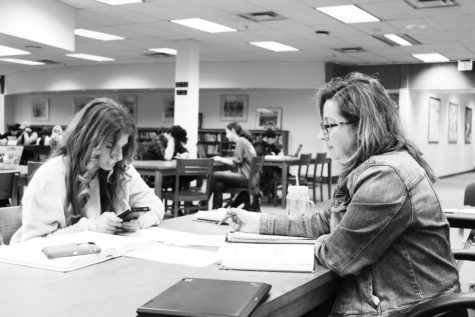Blood, bombs, binomials: math instructional assistant reflects on life in America

If Shacky Khachik, instructional assistant for the math department, would have decided to exercise her freedom to vote in her home country of Iraq, she and her family would have been killed.
“We knew about people who were against [Suddam Hussein, former president of Iraq], and they were ‘disappeared,’” said Khachik. “Not killed. You don’t know what happens. The person just disappears.”
After living her whole life in Baghdad, Khachik moved to the United States in 1997, escaping an increasingly chaotic political landscape and leaving behind her former job as a professor of computer science at the University of Baghdad. She had her teaching degree successfully transferred to the United States from Iraq in 2008 and started teaching math at Glenbrook North in 2015.
According to Richard Murphy, adjunct scholar for the Middle East Institute, since the execution of Hussein in 2003, Iraq has been in an almost constant state of unrest, with the U.S.-backed government fighting multiple terrorist organizations.
Khachik said in 1997, before she met her husband and left Iraq, her father was hit by a car driven by an unlicensed driver.
“When he got hit, he had brain damage, internal bleeding and because of the situation in Iraq at that time, we couldn’t get any justice,” said Khachik. “My dad was hit and killed, and the police did nothing.”
Khachik said moving to the United States brought safety and increased availability of resources, especially in regards to education.
“We got electricity from the city’s generators in intervals of three hours,” said Khachik. “[The city] cut the power every three hours, so you had to use your neighborhood’s generator. The generator needs fuel, which is costly, and also you cannot put many things on that generator. You’re [going to] use it for maybe a light and small fan. It’s still like this. I’m sure that students are struggling there, just to get the homework done or to study.”
According to math teacher Elana Horowitz, Khachik’s patience is chief among the traits that make her a good teacher.
“[Khachik] is willing and able to sit with a student and explain things in different ways and [keep] working with them without getting frustrated,” Horowitz said.
Khachik said the biggest challenge she faced coming to America was understanding American English.
“In Iraq, we studied British English, so every word [was] pronounced completely differently,” Khachik said.
Khachik said she fears president-elect Donald Trump’s plans to increase the United States’ involvement in the fight against ISIS.
“My nephew is still in Baghdad, and whenever there is fighting, civilians get killed,” Khachik said.
Khachik said both her former students in Iraq and those here in Northbrook appreciate her teaching methods.
“When I get feedback from my students, they tell me, ‘Mrs. Khachik, when you explain something you make it sound very easy,’” said Khachik. “That makes me happy because it means they’re getting what I’m saying. That makes me happy, and I want to do more.”

